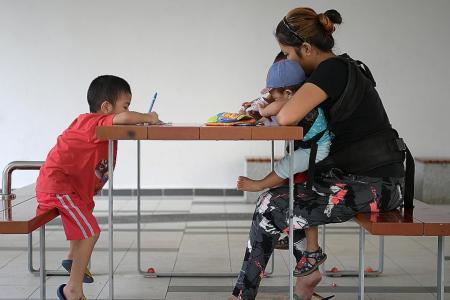Kids who miss out on pre-school risk falling behind
One mum says her oldest son had more trouble in primary school as he had less time in pre-school education
In 2014, Ms Shaodah Roslan tried enrolling her two older sons in a government-linked pre-school but was told she had to pay a deposit of $200 for each boy.
"I said, 'Never mind, I won't put them in school yet,'" said the 28-year-old housewife, whose husband works odd jobs and brings home about $600 to $700 a month.
A few months later, Ms Sharon Eng, a counsellor from the Singapore Children's Society, managed to find vacancies in a nearby PAP Community Foundation centre.
Ms Shaodah paid just $1.60 a month for each boy to attend pre-school, after help from the Kindergarten Fee Assistance Scheme and Start-Up Grant, which covers school fees and uniforms, among other expenses.
A record number of children are attending pre-school, with more enrolled at a younger age.
Latest figures from the Early Childhood Development Agency show that about 90,000 children aged two to four are enrolled in pre-schools, up from 66,000 in 2012.
Ms Shaodah's oldest son, now in Primary 4, attended just four months of Kindergarten 2 before going to primary school, while her second son, now in Primary 3, had more than a year of pre-school education.
"(My oldest boy) couldn't recognise most letters... He couldn't speak much English, compared with our neighbours," she said.
"Thankfully, he could catch up. Within two months, he could write his name, dates and recognise more letters," said Ms Shaodah, who has seven children, the youngest being seven months old.
Ms Eng also helped match three of her younger children to a nearby pre-school in 2016.
"I want my kids to go to school," said Ms Shaodah, who dropped out of secondary school at 16.
She and her husband, 32, who started work as a warehouse assistant after primary school, live in a rental flat in Yishun.
Experts said children from disadvantaged homes face the risk of falling behind their peers in terms of development if they are not provided quality experiences from a young age - whether at home or in school.
Dr Joanna Tay-Lim, a lecturer from the Early Childhood and Special Needs Education Academic Group at the National Institute of Education, said: "Vulnerable families, because of their circumstances, are often at a disadvantage to provide the type of nurturing care and environment needed for their child's optimal growth."
These families may lack resources or knowledge to meet their children's needs in learning or in nutrition and health issues, she said, and research has shown such children are often at risk of developmental delay, and have poorer cognitive and physical outcomes.
"This group of families needs special care and attention... in order to reduce the odds of unfavourable development for their child."
FOR MORE, READ THE STRAITS TIMES TODAY
Get The New Paper on your phone with the free TNP app. Download from the Apple App Store or Google Play Store now



